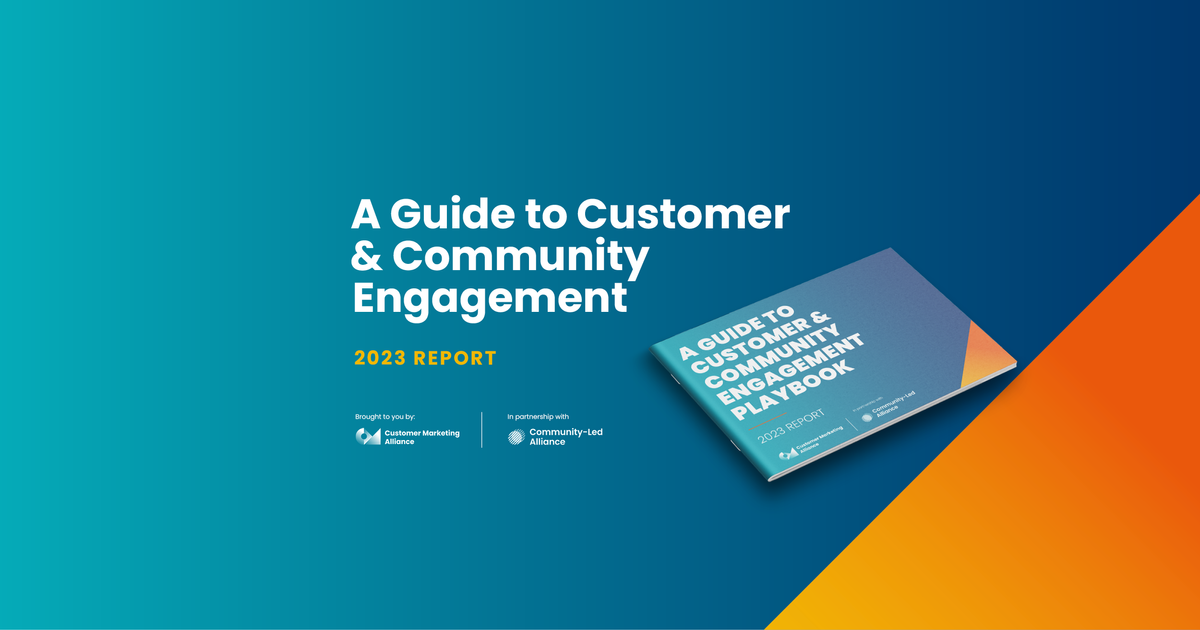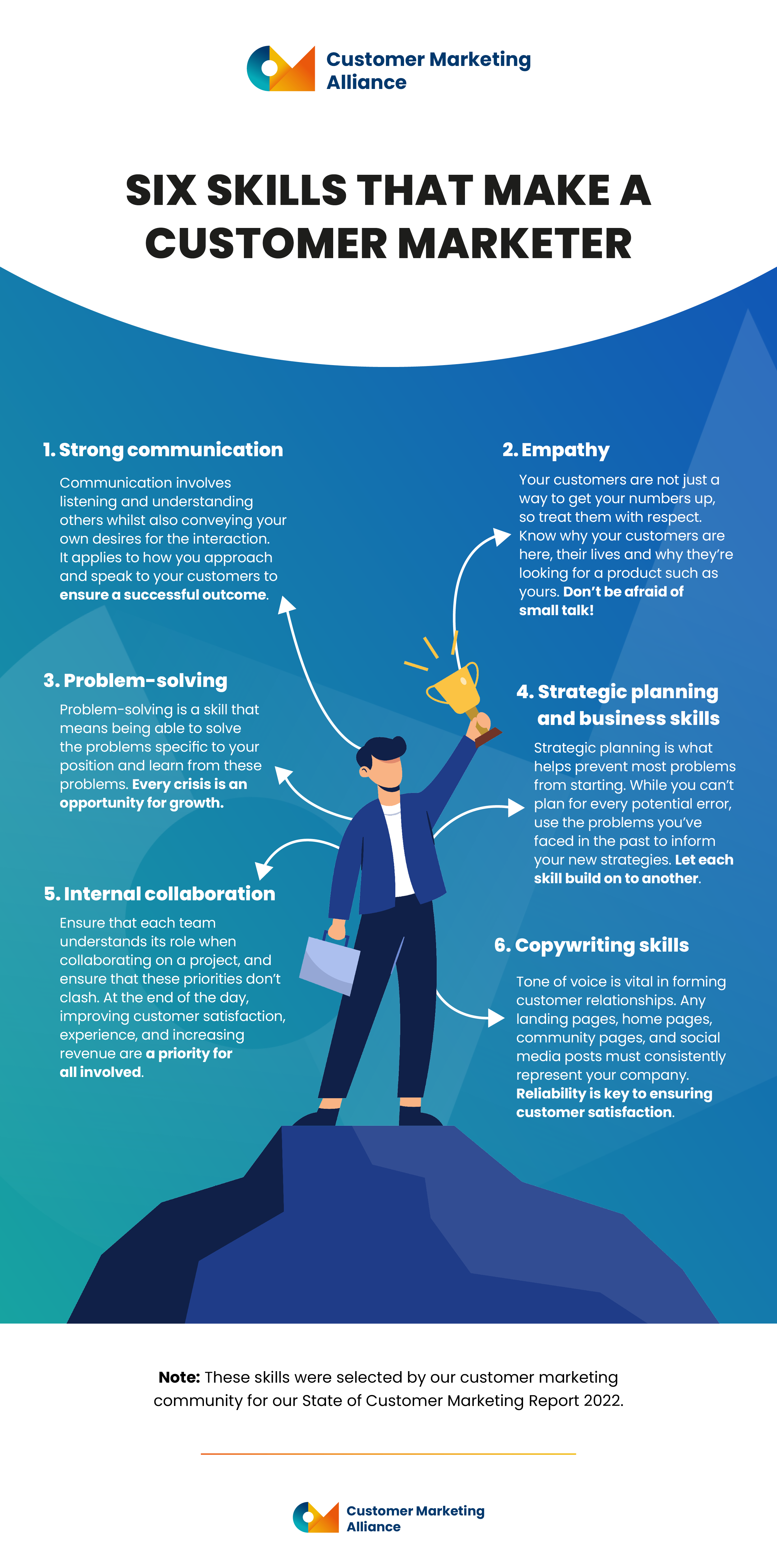While customer marketing may seem like a self-explanatory area of business marketing, there’s more to it than meets the eye. It’s new to the way businesses connect with their customers and has a different role in the customer journey than sales, product marketing, or even customer success.
It's also an incredibly fast-growing and highly desired role. LinkedIn found that Customer Marketing Manager was the third fastest-growing role in 2022.
Our A to Z of customer marketing provides you with an in-depth rundown of the essentials of customer marketing to help get you started on your journey.
In this article we'll cover:
- What customer marketing is,
- Why it’s important,
- The benefits of customer marketing, and
- How customer marketers connect with other marketing departments.
What is customer marketing?
Customer marketing refers to any marketing activity or campaign that is directed at your existing customers.
Customer marketers think about customer engagement outside of the product. Their main aim isn't to sell something to the customer (they’ve already done that) but to maintain the relationship between the customer and your business.
Maintaining this relationship is one of, if not the most important part of ensuring successful growth.

Why is customer marketing important?
It’s no secret, particularly in the B2B community, that retaining customers is a far more lucrative business than just focussing on getting new ones. Research has indicated increasing customer retention by as little as 5% can produce a 25% to 95% increase in profit.
Moreover, maintaining your existing customer base is also a lot cheaper than trying to attract new customers each and every time. If you have a consistent number of returning customers, then you’ll have a decent understanding of your base profits.
Benefits of customer marketing
Besides increasing sales, customer marketing has the potential to benefit almost every aspect of your business. A good customer-to-business relationship can have a knock-on effect throughout the rest of the marketing journey, and the information you get from customer marketing can aid a variety of other departments, as well as your own.
Understand your customers
Marketing and sales can often fall into the trap of prioritizing subscribers, clicks, or sales because these are tangible statistics to grab ahold of. But where existing customers are involved, things get a lot more holistic.
Unless you’re telepathic, the reason behind each change in those numbers isn't something you can know just by looking at them. So what do you do?
Well, you go directly to the source. Talking to your customers gives you an understanding of the most common pain points your product needs to solve. From there, you can develop accurate user and buyer personas that are based on real-life examples.

Confused about the difference between user and buyer personas? Our sister community, Sales Enablement Collective, wrote a concise and comprehensive piece on understanding the difference between the two.
Customer retention
Marketing to your existing customer base lets your customers know that you care about them.
Customers are the ones in control, and if they don’t see a reason to come back to your product, then they won’t. If they like 90% of your product, but don't have a way to put forward this feedback then chances are that if another competitor comes along that offers them the chance to feedback, then they’ll churn and switch their allegiance to that product instead.
When customers see you're taking on their feedback, this’ll improve your customer relations and they’ll feel more comfortable returning to you, instead of going to your competitors.
Customer advocacy
Once all is said and done, and you have your customers consistently engaged, the most significant part of customer marketing comes into play. This is where all your hard work pays off, and the customer-business relationship starts working for you.
Customers that recommitted to buying your product are much more likely to recommend it to others. They may refer friends or colleagues to your brand knowing that you’re consistent and reliable.
Third-party advertising like this is one of the trickiest types of advertising for marketing departments to measure and yet is what customers consistently feedback to be the type they are most likely to trust.
Creating case studies, interviews, surveys, customer reviews, and many other types of content can aid in encouraging word-of-mouth marketing. Customers are, after all, the best spokespersons for your brand.

Collaborating with other customer focussed departments
Throughout the customer journey, a variety of departments monitor the customer at different stages. Communication between these departments is vital for consistent and efficient customer-led growth.
Customer-led growth requires smaller groups with tight integration. With all these teams working together there is potential for any problems to be quickly identified and the appropriate teams assigned to solve them.

What makes a good customer marketer?
A good customer marketer possesses a combination of interpersonal and strategic skills. Strong communication and empathy are most often the ones to emerge as the most crucial, enabling them to connect effectively with customers and internal teams alike.
These skills are essential for gathering customer feedback, conducting surveys, and developing case studies, which are core responsibilities of the role.
The ability to collaborate internally is also highly valued, as mentioned above. Customer marketers often spend a significant portion of their time working with other departments. This collaboration helps to align business processes and break down silos within the organization.
Additionally, problem-solving skills and strategic planning abilities are important for anticipating and addressing challenges, as well as developing effective customer-focused strategies.
The best features of a customer marketer include:
- Strong communication skills
- Empathy and ability to connect with customers
- Internal collaboration capabilities
- Copywriting skills
- Problem-solving abilities
- Strategic planning and business acumen
- Proactivity and self-motivation
- Adaptability and comfort with developing programs independently

These attributes enable customer marketers to excel in their multifaceted role, balancing customer relationships, internal teamwork, and strategic initiatives to drive customer satisfaction and business growth.
Want to read more in depth about why we've picked these particular skills? Have a look below.

Where does customer marketing fit?
Product marketing
Customer marketing follows where product marketing leaves off. Customer marketing can help monitor the result of the product marketer's hard work. Customer marketers can contact customers and ask them what about the product they liked, and why they keep coming back.
Customer marketers are able to reach out to existing customers to understand the strengths and weaknesses of existing products. This gives companies access to vital information and feedback where it's needed. Supporting this internal communication can ensure an efficient and customer driven marketing strategy from beginning to end.
Sales
Customers are often creatures of habit. If they like your product and know that it works they're usually happy to come back and purchase it again. It’s all well and good for them to keep coming back and purchasing that one product, but what about all the other wonderful goodies your network provides?
Building customer loyalty by creating a more personal relationship between client and marketer can cement trust not only in your product but in your brand as well. When customers trust the brand, they're far more willing to look through your other material, meaning that you can begin cross-selling.
Reliable customers give you a consistent base of profits to start from, which is far more lucrative than solely focussing on acquisition. In fact, even without actively concentrating on customer retention, already 80% of future profits will come from just 20% of existing customers.
Customer success
Customer marketing and customer success both share a desire to create products and services to help customers achieve their goals. This means creating content that’s not aimed at trying to sell them anything, but rather to invest in their needs and desires.
The priority here is in creating a community in which you and your customers can thrive. This is a chance to collaborate with your customers in a way that puts them at the forefront even more so.
The main way customer marketers do this is through customer advocacy and advocacy programs. Whether this is through championship programs, exclusive courses or webinars, or customer collaboration, advocating for your customers is investing in them doing the same.
Customers that get this content are usually passionate about doing the same. If they know you're loyal to them and their futures, they'll return the sentiment.
They can do the legwork and networking for you by advocating for you to others in their own workplace. And when they move from one company to another, they're likely to bring you with them. Then you have a whole new base of customers without even leaving your desk!
Discover more
So, you’ve read about what customer marketing is and why it is important and you’re now looking to understand what goes into actually implementing it into your existing network. Well, we’ve just the thing for you with our Customer Marketing Certified: Core.
👩🏼🏫 12 modules
📙 40+ chapters
⏰ 10+ hours
🔥 6 fireside chats
👨🏼💻 100% self-paced
Customer Marketing Certified: Core's the industry standard, the driving force for your success, and the only companion you need for personal and professional growth.





